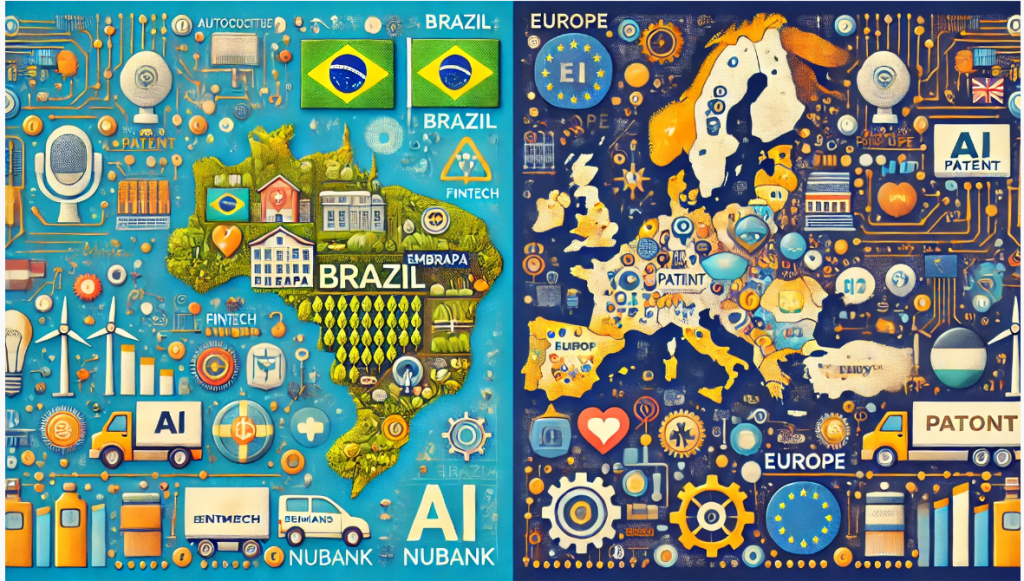Comparative Analysis of AI Patent Landscapes: Brazil vs. Europe
Author: Marcus Julius Zanon, June 28th, 2024.
In the rapidly evolving field of artificial intelligence (AI), patent filings serve as a key indicator of regional innovation trends and strategic priorities. This article offers a comparative analysis of AI patent activities between Brazil and Europe, highlighting the distinctive approaches, key sectors of innovation, and leading players in both regions.
Overview of AI Patent Trends
European AI Patent Landscape: Europe shows a robust engagement with AI technologies, led by industrial powerhouses like Germany and multinational companies such as Bosch, Siemens, and Philips. With a total of 2,928 AI patent applications filed over the last two years, Europe’s focus spans various cutting-edge areas, including machine learning, neural networks, and autonomous systems. German companies alone have contributed 739 applications, reflecting the country’s strong industrial base and leadership in technological innovations.
Brazilian AI Patent Landscape: Brazil’s AI patent filings are gaining momentum, with a significant concentration in São Paulo, the country’s technological hub. The regional innovation primarily targets sectors like healthcare, automotive, and digital commerce. Emerging trends include AI applications in AgriTech and fintech, focusing on crop analysis, climate impact assessments, fraud detection, and risk assessment. Key players include local startups and research institutions that are beginning to embrace AI to enhance operational efficiency and competitiveness.
Sector-Specific AI Innovations
Healthcare:
- Europe: Companies like BioNTech and Moderna are notable for their AI-driven approaches in biotechnology, particularly in rapid vaccine development and personalized medicine.
- Brazil: AI innovations focus on predictive healthcare models and diagnostic tools, aiming to improve treatment strategies and healthcare delivery.
Automotive:
- Europe: Autonomous driving technologies and AI-integrated vehicle safety systems are prominent, with companies like Bosch and Siemens leading the way.
- Brazil: AI applications in the automotive sector are budding, with a focus on enhancing manufacturing processes and vehicle safety through AI.
Digital Commerce:
- Europe: AI is extensively used for enhancing customer experience and operational efficiencies. Companies like Amazon and DeepMind Technologies push the boundaries of AI in e-commerce and data analytics.
- Brazil: AI-driven tools are increasingly adopted by retail and e-commerce sectors to personalize customer service and optimize supply chain management.
Key Innovators and Patent Filings
Europe:
- Bosch has filed over 100 AI-related patents, leading the region’s surge in AI technology applications across multiple sectors.
- DeepMind Technologies, though not prolific in patent filings, is influential in the AI research space, contributing significantly to AI advancements.
Brazil:
- While specific leading innovators in Brazil are not as prominent internationally as in Europe, local universities and tech startups are key contributors to AI patent filings.
- The focus in Brazil is more on practical applications of AI in sectors such as agriculture and healthcare, driven by local needs and market dynamics.
Strategic Insights
Europe:
- The strategic orientation in Europe is towards consolidating AI advancements in traditional industries like automotive and manufacturing, and extending capabilities in healthcare and pharmaceuticals.
- Investment in AI is seen as a long-term competitive strategy, with significant support from governmental and EU-wide initiatives.
Brazil:
- Brazil’s AI strategy is more fragmented but shows considerable potential for growth, particularly in integrating AI within sectors like AgriTech and fintech.
- There is a growing emphasis on partnerships between tech companies and academic institutions to fuel AI innovation.
Conclusion
The comparison between Europe and Brazil in AI patent filings reveals distinct regional priorities and innovation landscapes. Europe’s AI patent activity is characterized by a well-established, diverse technological base and a strong push towards integrating AI across multiple industrial sectors. Brazil, while nascent in its AI development, shows targeted growth in sectors where AI can significantly enhance efficiency and outcomes. Both regions demonstrate a strong future orientation towards AI, but the pathways and impacts are shaped by their unique economic, industrial, and technological contexts. As AI continues to evolve, these differences will likely influence how AI technologies are developed and deployed globally.
